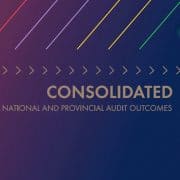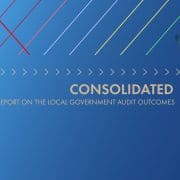|
Getting your Trinity Audio player ready...
|
• Learners from Camagu Primary school cross a river. Image: Bonile Bam/New Frame
By Thato Mahlangu
Innocent people’s lives are at ‘great risk’ because of government and corporate greed, warns a Ndakeni resident, community activist and whistle-blower (in his 30s) whose identity is known to Corruption Watch (CW).
Ndakeni, a village within the Mbizana area in the Eastern Cape, is home to thousands of people, mostly unemployed.
The whistle-blower told CW in September 2019 that most of the Ndakeni residents don’t want the N2 Wild Coast road upgrade project – a South African National Roads Agency Limited (Sanral) initiative – to proceed.
He said indirectly it has destroyed their homes, had a negative impact on their health, is threatening their only source of water and is leading to increased levels of corruption as the road is used to transport titanium.
The man said he believes that the N2 Wild Coast road upgrade project is being pushed through by local government officials and a mine owner to provide quicker routes to transport the titanium that they [local government officials and the mine owner] want to mine at Xolobeni.
But the man accused of being at the centre of the project, Ayanda Notshweleka, who is the owner of Masakhane Project Managers and Quantity Surveyors [company responsible for the operations] said it was crushed stones, not titanium that is being transported from the Dudumeni quarry to a site where the bridge [called Mtentu] will be built.
The Mtentu bridge forms part of the proposed N2 Road upgrade from Durban to East London, which is a national project for Sanral and is meant to a service portion of the Eastern Cape.
Numerous concerns have been raised by environmentalists and justice activists like Vanessa Burger, who has been working with vulnerable communities for years.
However, Sanral’s spokesperson Vusi Mona responded to CW’s questions (which were sent via email) last month, 18 October, that the N2 Wild Coast road forms part of the National Development Plan and is a key project in the Strategic Infrastructure Programme 3: South East Node and Corridor development.
“The project is a key infrastructure investment by the government to improve logistics and mobility between KwaZulu-Natal and Eastern Cape provinces, (to) stimulate local and regional economic development and (to) provide improved access and socio-economic opportunities to a region of Pondoland that is currently extremely isolated and underserved by road infrastructure,” he said.
Mona also told the Daily Maverick on 19 March 2019 that the public was misinformed about where the project would take place, stating that it was not a coastal route as the highway is 10 to 15 kilometres inland to avoid the most sensitive part of Pondoland’s biodiversity.
“This biodiversity must be protected as the Wild Coast in the Eastern Cape is one of the most beautiful parts of our country. However, it is also one of the poorest and would be well served by the development of a road system to encourage tourism and open up the region to economic opportunities.”
Only Empty Promises For Residents
Located at Ndakeni village, the Dudumeni quarry was initiated in 2014 to mine stone used in the N2 upgrade. The mine has, however, impacted negatively on people’s homes, which crack when the rocks are being mined and processed.
Residents also claim they have not benefited from social responsibility projects that they were promised would flow from the quarry – a contract worth R54-million, according to a statement on Sanral’s blog-site.
“In 2014 when the quarry started the mine owner promised many projects to help uplift the community. But they have not materialised,” claimed the whistle-blower.
But Sanral’s Mona refutes the claims, he said all the 10 villages have directly benefitted on the quarry project in terms of creation of jobs and projects such as roads construction and upgrading.
Instead, the whistle-blower says more and more developments that are currently taking place in Ndakeni (like the Dudumeni Quarry project) only benefit greedy local government officials and business people.
Still, Sanral is adamant that the projects are benefiting thousands of people in the Eastern Cape, particularly job seekers.
“Communities and small local businesses have also benefited from, contracts, jobs, and training on the 4 Haul road contracts for the roads leading to the 2 mega-bridge sites as well as the two mega-bridge contracts. However most of the benefits for communities will still be realized over the course of the implementation of the 7 roads packages to come,” Mona said.
When asked about the alleged corruption that is taking place with these projects, Mona said he is not aware of any corrupt activities which involve any local government officials and business people or Sanral as the tender was won fairly.
“Sanral did investigate the procedure and process followed by Aveng Strabag Joint Venture in the selection of the Dudumeni Quarry site (owned and operated by Masakhane Project Managers and Quantity Surveyors) over various other potential sources and were satisfied that the process followed was fair, competitive and cost-effective,” he said.
Notshweleka told CW this week via email, 29 October 2019, that he was not aware of any corruption linked to the project.
He explained that the contract to supply aggregates (crushed stone material) for the construction of Mtentu bridge. O the total value of R54 Million, 60% of that amount was meant for transportation from the quarry to the bridge site, at a distance of 80 kilometers.
“The said project was terminated last year October due to challenges faced by the main contractor for whom we were a supplier.”
Notshweleka said the contract has since been terminated.
“The material that was meant to be delivered was not delivered to the site due to the said termination and more than 22 000 cubic meters is still on stockpile on site unpaid for and we have experienced serious financial constraints due to the termination or project stoppage,” he said.
Corruption At The Centre Of The Mbizana Community
The whistle-blower said there was so much corruption happening in the Mbizana area, which goes unreported in mainstream media.
“This is affecting thousands of people.”
He warns that should mineral resources minister Gwede Mantashe give more mining companies licenses to mine what is left of some of Mbizana’s resources, communities, including Ndakeni and Xolobeni, would be in great danger.
“There would be a tragedy,” he said. “Those mining projects would take away people’s last respect and dignity they had. If someone moves you or takes away your land, what happens to your dignity as a black person? What happens to your heritage?” asked the man.
He said some of his relatives’ homes will be destroyed, “leaving us with nothing to remember or hold onto as part of history as AmaMpondo people, our biodiversity. Our children won’t know where we were born or if we ever existed.”
Residents’ Health Negatively Affected
The whistle-blower said since the mining project started almost six years ago, the health of most locals around Ndakeni has changed.
“More people are becoming sick. It is this air we breathe which is polluted by the dust they inhale. This affects elderly people and children,” he said.
The other concern is that the residents’ houses are cracking because of blasting at the quarry. Blasting is carried out several times a week, including at night.
“These are poor people, they can’t afford to keep repairing their homes which are being damaged by the blasting,” he said.
Notshwekela said he was not aware of any damages made to the homes of Ndakeni resident, and said that Ndakeni is almost 3 to 4 km from the quarry, which makes it impossible for any impact to be felt.
“In terms of the health and safety, blasting should have a clearance distance of not less than 500m from the buildings and all buildings are in excess of the required distance,” added Notshwekela.
The whistle-blower added that the mine owner was meant to provide them with a social and labour plan, which is a document that mining companies are required to submit to the Department of Mineral Resources and Energy as part of their applications for mining rights.
It is basically a collection of promises the mine makes, which become legal commitments once the application is approved by the department. These promises, according to the whistle-blower, would include but not be limited to the hiring of locals and would ensure that locals get to benefit from any mining activity.
“It also helps mining companies track their corporate social responsibility on how to reduce or avoid negative impact their mining activities would have on the community,” the whistle-blower said.
But Notshwekela said he has permission to continue operating at the mine.
“The current operation is holding a mining permit,” Notshwekela said.
“The mine owner promised to build a bridge to make it safer for children at Camagu Primary School to get to school. After that project was announced people got excited. But to our surprise that bridge has not been built even today.”
Camagu Primary School provides free education for children whose parents cannot afford fees. But the school is located quite far from many homes and pupils have to cross a stream to get to school. When it rains, the stream floods and it is dangerous to cross. The children are then either forced to miss school or have to walk much further to get around the stream.
Other initiatives promised as part of the mine’s corporate social responsibility projects included a preschool, youth development projects, and a borehole.
The project, if successful, was to see almost 100 people being employed, said the whistle-blower, something he says never materialised.
But he mine owner disputes this claim.
“[The project] has created the jobs as planned. Since the establishment of the quarry local contractors were appointed for fencing, building, security, and transportation. As of October 2016, 52 staff members are employed at the quarry and 16 of those are in long term employment,” Notshweleka said.
Responding to questions sent via e-mail, the Department of Mineral Resources and Energy said it was true that the quarry is currently operating under a mining permit as the owners of the mine were still waiting for a mining right which has not been granted.
“But permit holders are not required to submit and implement a social and labour plan. Brainwave Projects 848 CC [another name the company owned by Notshweleka trading under] has applied for a mining right, and it has not been granted yet. This means that there are no SLP obligations yet at this stage,” read the email.
Police Believed To Be Involved
The Ndakeni whistler-blower, who claims to have been attacked by the police early this year, said more activists from the village and those nearby, are said to be targeted by police who are suspected of being involved in corrupt dealings with the quarry owner, local government officials and political leaders.
“Police are playing a role in protecting corrupt high-ranking politicians and provincial government officials.” said the whistle-blower.
He said there is no protection guaranteed for people like him who speak out against corrupt leaders and business people. “Instead you are attacked for speaking the truth like I was after addressing a rally earlier this year. Or worse, you get killed.”
Death threats are sent to him occasionally; this leaves him with no choice but to run away from his home.
Auditor-General’s Damining Findings
The 2017/2018 Auditor-General’s report on the financial state of the Eastern Cape found five regressions and four improvements in the province, resulting in a net regression.
According to Auditor-General Kimi Makwetu, the overall financial health of municipalities in the province regressed, as 76% of the municipalities had concerning financial health indicators or required intervention, compared to 66% in the previous year.
“Of these municipalities, 29% (2016-17: 21%) faced significant cash flow and viability challenges, which were emphasised in their audit reports.”
He said he commended municipalities in the province for spending 96% of the conditional grants that were allocated for infrastructure development.
Makwetu advised the province to improve its outcomes by making sure that political and administrative leadership strives to create a culture that will result in a responsive and accountable local government.
“The tone at the top must be focused on ethical leadership and good governance, supported by a well-capacitated administration with an emphasis on filling the municipal manager and chief financial officer roles with competent individuals in order to promote stability.”
In April 2019 non-profit research organisation Good Governance Africa (GGA) published the second edition of its Government Performance Index (GPI), a study that examines the performance of local municipalities according to a number of important indicators.
Mbizana municipality, which came in last in the first edition of the study, published in 2016, moved up in 2019 to 2016 – out of 213 local and metropolitan municipal areas surveyed.
GGA has also started several developmental initiatives to improve Mbizana, and in March 2019 entered into a memorandum of understanding with the municipality.
Ndakeni Service Delivery And Water Wars
According to a report written by Burger, Ndakeni Service Delivery and Water Wars, five years after its inception, communities are yet to benefit from the Greater Mbizana Regional Bulk Water Supply Scheme – an infrastructure project which saw national government spend R250-million on the Ludeke Dam which was to provide water to local communities.
“To this day, many Ward 8 villages remain without sanitation, taps or access to clean water,” Burger said, adding that residents are forced to share filthy water from a nearby stream with cows and pigs.
She also reported that “Since the quarry began operations at Ndakeni village, this stream – residents’ only source of water – is now under threat as the mine draws large amounts of water from the same source. Residents have reported that water levels in the stream have dropped considerably since the mine started.”
She said boreholes that the mine owner allegedly promised to drill for the community had apparently not materialised.
“Community protests for improved service delivery, especially the provision of clean water – a basic human right – has led to a brutal response by police who used live ammunition on protestors in June 2018. Local government failure and allegations of corruption are therefore leading to increased conflict between the police and communities who have seen little improvement in their living conditions after 1994,” said Burger.
The whistle-blower said all the things which Burger alleges are true.
“She knows our plight and is doing all she could to help which is to write about it,” he said.
Communities Are The Biggest Losers
Our legal work as CW has yielded the Mining Royalties Research report which illustrates how communities are robbed of their livelihoods as profits from mining activities are not shared equally with communities.
The report describes how vulnerable the royalties system as it leaves room for monies amounting to billions of rands being squandered, stolen or diverted because of infighting and maladministration of community funds.
Most of these communities are being robbed of these monies while mining operations continue to take place on their land.
According to the report, royalties would previously be managed under the infamous D-account administration, which made provincial government the custodian of the mining royalties, but the trend these days — in North West, certainly — is rather for communities to convert this financial arrangement into equity or shareholding as the operating mine’s BEE partner.
We reached out to the Department of Transport and the Alfred Nzo District Municipality for comments but to date, we have not received any response.







